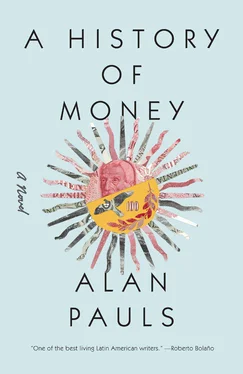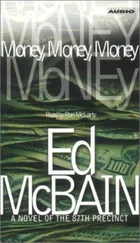It’s the same for his mother. Recently married, with him already on the way, the unplanned fruit of one of the skirmishes they get entwined in before they’ve thought about whether they’re in love, though they’re both already equally fixated on the idea of getting away from their respective families as soon as possible, she notices that her perfect stomach, which is as flat as a board and blessed with the kind of skin people dream of — one of those stomachs that always appears in black and white and extreme close-up in the artistic photography of the day, looking like a beach or a lunar landscape — is stretching and beginning to bulge as steadily as her husband’s nightly returns to the apartment on Ortega y Gasset grow later. The night she realizes, the telephone is silent, the cleaner at the office tells her that everyone has left, the meal is cold and already inedible, the cinema plans aborted. One night he doesn’t show up until twenty past four in the morning. When he appears, with a long day’s stubble and a halo of cigarette smoke strong enough to knock her flat, he says he got into an accident in the street: he left the office and was crossing the street when some idiot drove right over him. He didn’t get out of the police station at Suipacha and Arenales until half an hour ago. She doesn’t know what to think. She doesn’t know him. She only knows about him, and about the clumsy but comforting force of his Germanic lunges, about everything in him that exasperates and disappoints her, about the collection of flaws that define him, and everything that she will dedicate herself to criticizing for the forty years she spends without him, free of him. She can picture the altercation in the street, although she knows from experience that if it really happened, it wasn’t because of an abuse of his pedestrian’s right of way, unless by right of way her husband understands what he obviously does understand — the right to cross the road when and where he likes, preferably wherever the traffic is densest, when the cars have a green light and no pedestrian with half a brain would think to cross, let alone as defiantly and arrogantly as a true artist of danger.
She thinks he has a lover. His mother is young and beautiful; she’s as voracious as every woman on the run and has the rancor of an aristocratic lady in exile, forced to dress in secondhand clothes and eat reheated food. The ideal candidate to be tied down with a child by the first scoundrel to seduce her while he swans around elsewhere. It happens to all of them. Why should she be the exception? His mother never even mentions it. Every time she feels the urge to ask, she has the sensation of treading on very fragile ground, like a carpet made of glass. It’s as though she’d been born without skin. She’s frightened by her clothes every time they brush against her, of the noise her throat makes when she swallows, and of the tremulous half-moons of light that the sun projects onto the ceiling when it breaks through the crown of the banana palm whose branches overrun the balcony. Some mornings she wakes up and doesn’t even have the courage to open her eyes. But the thing that terrifies her most is giving him a reason to get rid of her — and she thinks anything could be a reason. One night she goes to bed alone. Every minute she passes without him is a minute lost in the torture of waiting for him, sinks her a meter further into a dark morass that won’t kill her but does poison her with hatred. At ten past six in the morning, she hears a key scratching at the door. She shifts onto her side in the bed, turning her back to him, and pretends to sleep. She doesn’t want to speak to him, doesn’t want to see him. Only to sense him, as though she were hidden behind a door with a knife under her clothes, waiting for the perfect moment to sink it into his chest. He doesn’t make any pretenses. He doesn’t even try to be quiet so as not to wake her. He takes off his clothes — a cufflink jangles against the bronze base of the bedside lamp — showers with the door open, gets dressed, goes out again. She doesn’t go back to sleep. She will never forget the sound of those keys.
In the middle of the morning, her mother comes to visit. She brings new clothes for the baby, another of the ensembles covered in belts, ruffles, and bows that she buys compulsively, enchanted by the idea — an accurate one, incidentally, which makes it even more depressing to her daughter — that they’re just like the clothes they bought for her before she was born, and she accepts them and files them away in the closet where she keeps the still lifes, swans made of green glass, and cretonne curtains that have been lavished upon her since she got married. After thirty sleepless hours, she can’t even stir a cup of tea, let alone hold one, and the cup smashes to pieces on the kitchen floor. She starts to cry and confesses, and as soon as she has confessed she realizes her mistake. If there are two people in the world who cannot help her, they are her parents. Her mother is a tiny, bitter woman, who believes she’s given all she had to give — as little as that may have been — and who now limits herself to relaying her daughter’s dramas to her husband. Her father, a corpulent despot who communicates in growls and wears very high-waisted pants, receives the problems and bends them to his own will, using them to support the cause he will never tire of championing: demonstrating to his daughter that, for as long as she chooses to live away from them, her life will be a catastrophe. She pleads with her mother not to say anything, not to humiliate her in front of her father. Her mother, smiling at her, tells her not to worry. But it’s too late. The moment she gets home, the woman picks up the telephone, calls the factory, and passes her report on to her husband.
There’s a young man from Tucumán at the factory, the brother of a foreman recently fired for stealing, whom his grandfather kept on partly out of spite, to torment the man he’d fired — from whose betrayal he never recovers, being an immigrants’-son-turned-boss and an incorrigible paternalist — and partly because it’s convenient. The boy is naïve; for a few coins he’ll do things that nobody else would do — errands, preparing mate cocido, acting as a chauffeur or night guard — and he has ambitions that his gratitude to the boss only strengthens. He’s enlisted for some overtime (yet more to add to the great quantity he’s already amassed, which even combined would never add up to a wage): to see what the boss’s son-in-law is up to. Six hundred of the pesos of the day, pesos moneda nacional: exactly the amount his father needs, four nights later, to stay in at a surprisingly, inexplicably adverse poker table, which something tells him it’s still not time to leave even though he’s been completely cleaned out. It’s five past five on a raw winter’s dawn, and his father’s gone out into the street to smoke in his shirtsleeves. A sweater would keep him warm. Gambling is better: it makes him invincible. He stubs his cigarette out on a paving stone, spits a resigned stream of smoke into the frozen air, the last of the night, and when he raises his eyes he catches a glimpse of the boy from Tucumán’s shadow moving across the street, or rather shivering from the cold in the alley he’s been standing guard in for some time. It takes him five seconds to work out that it’s someone, ten to cross the street, twenty to catch up with the boy from Tucumán after he tries to run away, half a minute to recognize him — he remembers him well: he’s the boy who laughed under his breath on one of the two visits his father has paid to the factory in order to please his father-in-law, when he said that his favorite thing about the place was the workers’ clothes — and a minute — prolonged by the bottle truck that drives past, making a racket that obliges him to repeat the arrangement he’s proposing a second time — to take from him the six hundred pesos he’s just earned. It’s only a loan, he tells him, underpinning the idea with subtle nepotistic insinuations. He’ll return it in two hours, without fail, in this same alleyway, only quadrupled. A little while later, she emerges from another strenuous bout of insomnia and finds him in the kitchen, sitting with the back of a chair between his legs, swirling a recently made cup of coffee in his hands. He’s just shaved, he looks younger than ever, and he smiles like an awestruck child. “I was dead. A real beating: I hadn’t won a single hand,” he tells her, his eyes wide. “The guy from Tucumán your father hired to follow me ended up rescuing me.”
Читать дальше












